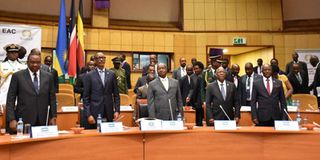Is Kenya losing its mojo in the region?

East African Community Heads of State Paul Kagame (Rwanda), Yoweri Museveni (Uganda), Uhuru Kenyatta (Kenya), John Magufuli (Tanzania) and Gaston Sindimwo (Burundi VP) at a past EAC summit.
What you need to know:
- Somalia was seen to be retaliating against Kenya’s enhanced security restrictions against flights from Mogadishu and alleged interference in internal matters.
- Rwanda, the other East African partner, is building its own inland depot while exploring a free trade zone at the port in Djibouti.
Kenya’s long standing clout in the region appears to be diminishing in the years Jubilee has been in power, leading to economic and diplomatic losses.
While the government says all is not lost, experts feel Kenya — the region’s largest economy — needs to do more to boost its standing amid aggressive reaction by neighbours to various moves.
For decades, dozens of planes loaded with miraa have taken off from the Wilson Airport in Nairobi everyday headed for Somalia.
Today, the hangar that handled goods that brought millions of shillings a day to farmers in Mt Kenya East has gone quiet.
The miraa (khat) trade is one of the victims of Kenya’s increasingly strained relationship with its neighbours after Somalia banned importation of the stimulant from Nairobi while allowing Ethiopian imports.
Enhanced security
"If Somali consumers are allowed to get used to the Ethiopian variety of miraa, we may lose the market forever,” Nyambene Miraa Traders Association chairman Kimathi Munjuri told the Daily Nation last month.
Somalia was seen to be retaliating against Kenya’s enhanced security restrictions against flights from Mogadishu and alleged interference in internal matters.
Ties between Kenya and Uganda, its largest trading partner, which were previously affected by the dispute over the Migingo Island, have lately been strained by Uganda's unhappiness over slow clearance of goods at the Mombasa Port.
Meanwhile, relations with Tanzania appear to be getting more hostile, especially following disputes over Covid-19 restrictions.
Recently, the countries renewed the long-running trade dispute due to disagreements over procedures of testing truck drivers and Tanzanian citizens at the common borders.
There was also the requirement by Kenya, which was promptly dropped under pressure from Dar, that Tanzanian travellers to Kenya would be forced into mandatory 14-day isolation.
Among retaliatory actions by Dar was the ban on flights from Kenya, including the national carrier Kenya Airways. This was, however, rescinded when President Uhuru Kenyatta’s administration dropped Tanzania from the public health requirement list.
Covid-19
President John Magufuli’s administration has maintained that there is no Covid-19 in the country.
Kenya did not have high-level representation during the recent inauguration of President Magufuli for his second term in early November.
Things are no better with Ethiopia. There have been tension between troops of the two countries serving in Somalia and incursions by Ethiopian security forces into Kenya.
Rwanda, the other East African partner, is building its own inland depot while exploring a free trade zone at the port in Djibouti.
The decision by Uganda, Rwanda and Tanzania to join forces to implement a Wold Bank-funded financial project that aims to connect regional stock markets electronically further shows Kenya’s continued isolation.
Ministry of Foreign Affairs Principal Secretary Macharia Kamau said Kenya and Somalia are on course to set up a trading agreement that reflects 21st century relations. In East Africa region, relations are improving despite past down turns.
“But if you look at communities around the world including the European Union they were not built overnight. And they had their ups and downs in their development. That is normal,” he said in response to Sunday Nation enquiries.
Some analysts blame Kenya’s woes on a 2013 foreign policy change.
Prof Phillip Nying'uro, head of political science at University of Nairobi, said the Office of the President and the Foreign ministry should do better.
Infantile diplomacy
“Kenya has failed to exploit its advantage in the East African Region. Mwai Kibaki administration put Kenya on the driver’s seat, it was instrumental in the East Africa Community Customs Union and so on. What we have now is erratic behaviour by those at Ministry of Foreign Affairs. After Kibaki, we can say there has been infantile diplomacy,” he said.
Prof Nying’uro notes that Kenya lost its lustre during the International Criminal Court cases facing President Kenyatta and Deputy President William Ruto because it had to drop its principles in order to get support of many nations at the Africa Union.
“During ICC we dealt with everyone because we needed their support, Kenya sacrificed moral principles. On Burundi we lost an opportunity to intervene in their political problems, Somalia has treated Kenya badly yet 98 per cent of their security is because of Kenya. We should be able to issue credible threats at minnows, yet this is not happening," he said.
He says Kenya’s decline in the regional stage can be traced back to 2008 during the Grand Coalition government when domestic politics interfered with foreign policy, but things got worse from 2013. But he says all is not lost and Kenya could regain its shine.
“Democratic gains by Kenya are irreversible and that creates a stronger nation, some of Kenya’s neighbours have weak political systems. All is not placed because international powers still regard Kenya highly. All Kenya needs is to use this huge potential,” he said.
Further, Kenya, which is the largest exporter of labour in the region, has seen some of its high-profile professionals denied work permits when they seek work abroad.
Analysts now say that Kenya should urgently review its approach to foreign policy, given that its style adopted over the last few years has been counterproductive, isolated the country and boosted rivals.
“Kenya is a trading country,” said one veteran diplomat who requested anonymity. “We cannot assert ourselves over the region militarily because that is not who we are. Instead, we should use soft power and make sure we draw maximum benefits from relations across the region.”





